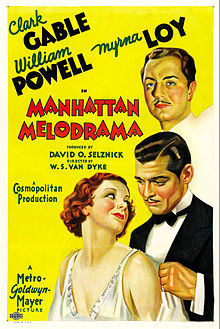Manhattan Melodrama was made by MGM in the same year that Clark (the King) Gable appeared in Columbia’s “It Happened One Night.”
Grade: B (***1/2* out of *****)
| Manhattan Melodrama | |
|---|---|

Theatrical release poster
|
|
| Directed by | |
Frank Capra’s comedy won the Best Picture Oscar, and Gable received his first of three Best Actor nominations and his only Oscar Award.
Gable heads a charming cast that also includes William Powell and Myrna Loy, forming a romantic triangle.
By today’s standards, the picture is chatty (even verbose), due to an overlong court sequence. But back then, it was one of MGM’s most prestigious productions.
The story begins in 1904, when the excursion steamer “General Slocum” blows up and burns in the East River. Orphaned by the disaster, three young boys are then adopted by a kind Jewish businessman (Harry Green).
Years later, when the adoptive is killed during a rally, the boys are separated once more. They grow up to be assistant district attorney Jim Wade (William Powell), gambler and owner of gambling house Blackie Gallagher (Gable), and priest Joe Patrick (Leo Carrillo).
Despite shared past, the men now represent opposite sides of the law. Their professional competition becomes all the more personal when Jim marries Blackie’s former squeeze, Eleanor (Myrna Loy). Blackie does not object when Eleanor leaves him, because he considers Jim to be a better, worthier man for her.
In the end, Jim’s integrity and professional ethos force him to prosecute his childhood pal, which wins him the nomination and election to the position of the governor.
The reliable MGM supporting cast includes Nat Pendleton as Blackie’s faithful stooge, Isabel Jewell as his girlfriend, Mickey Rooney as the younger Blackie, and blonde singer Shirley Ross, here appearing in blackface in a Harlem nightclub, singing a new Richard Rodgers and Lorenz Hart tune, “Blue Moon,” which would later gain extra popularity and iconic status.
“Manhattan Melodrama” became more famous and infamous, as the movie that real-life gangster John Dillinger attended on the night he was killed. In fact, clips of “Manhattan Melodrama,” were shown in several later films, including Michael Mann’s “Public Enemies,” starring Johnnie Depp as Dillinger.
The structure of the tale, an epic saga of kids who are intimate friends but grow up to be rivals and enemies, was used in many pictures, including “Angels with Dirty Faces” and “Cry of the City.”
Arthur Caesar who wrote the story, won the Oscar, though the actual screenplay was penned by Oliver H.P. Garrett, Joseph L. Mankiewicz, and others. Mankiewicz would become a distinguished director on his own right, director, best known for writing and directing the 1950 Oscar-winning picture, All About Eve.
The Hollywood Reporter represented many critics when its critic wrote: “Gable’s back to the type of role he does best, a do-gooder gangster.”
The movie was hugely popular at the box-office.
My book:
Oscar Nominations: 1
Original Story: Arthur Caesar
Oscar Awards: 1
Credits
Running time: 93 Minutes.
Directed By: W.S. Van Dyke; George Cukor (uncredited) shot some scenes.
Screenplay by Oliver H. P. Garrett, Joseph L. Mankiewicz, David Ogden Stewart (uncredited), Story by Arthur Caesar
Produced by David O. Selznick
Cinematography James Wong Howe
Edited by Ben Lewis
Music by William Axt
Production company: Metro-Goldwyn-Mayer
Distributed by Loew’s Inc.
Release date: May 4, 1934
Running time: 93 minutes
Budget $355,000
Box office $1.2 million











